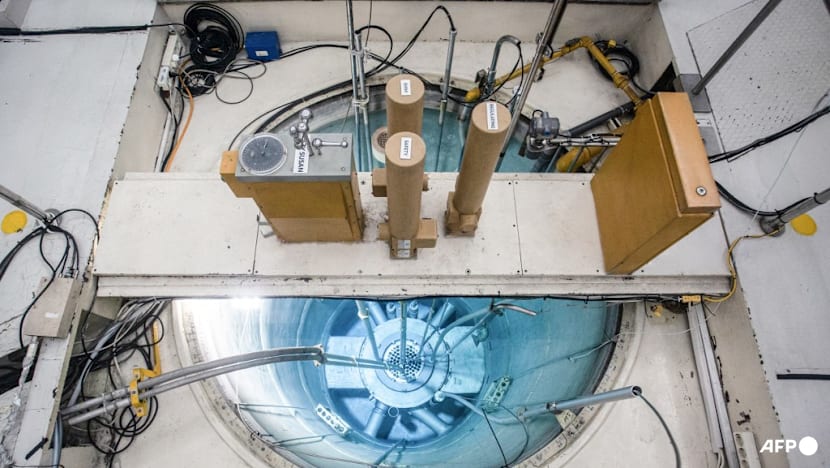Singapore building nuclear expertise to be an 'intelligent observer' amid regional push: Expert
Singapore should develop such capabilities regardless of whether the government decides on a nuclear power programme, said Professor Laurence Williams, chair of the National Environment Agency’s Nuclear Safety Advisory Panel.

This photo taken on May 22, 2025 shows a general view of the nuclear reactor operation chamber at the Kartini Nuclear Reactor research facility of the National Research and Innovation Agency in Yogyakarta, Indonesia. (Photo: AFP/Devi Rahman)

This audio is generated by an AI tool.
SINGAPORE: By deepening its understanding of nuclear technology, Singapore can better engage regional partners and assess potential risks, said Professor Laurence Williams, chair of the National Environment Agency’s (NEA) Nuclear Safety Advisory Panel.
In an interview with CNA’s Singapore Tonight programme on Friday (Nov 14), Prof Williams said that it is important that Singapore develops such capabilities “irrespective of whether the government decides on a nuclear power programme”.
The country is studying nuclear power as a potential low-carbon energy source.
The Energy Market Authority (EMA) is assessing the feasibility of deploying advanced nuclear energy technologies in Singapore.
Earlier this year, the NEA set up its advisory panel to guide Singapore’s capability building in the areas of nuclear safety, security and safeguards.
Prof Williams added that it is important that Singapore is an “intelligent observer” with the capability to understand what nuclear technology is and what the risks associated with nuclear are.
He said such expertise would help the nation “talk to neighbouring countries if they are developing nuclear power programmes, to be able to influence them, but also have a deep understanding of what it would mean for Singapore”.
Other Southeast Asian nations such as Malaysia, Indonesia, Vietnam and the Philippines are also exploring nuclear energy.
However, Singapore cannot confirm the current state or level of maturity of their plans, Minister-in-charge of Energy and Science & Technology Tan See Leng said earlier this month.
Singapore is working closely with international agencies like the International Atomic Energy Agency to "triangulate" the available data, Dr Tan told parliament.
Prof Williams stressed the importance of international collaboration.
“Singapore has a good base to start from. It's got good universities, good engineers, good scientists. Being able to share knowledge and experience with countries with more advanced programmes is absolutely essential.”
WINNING PUBLIC ACCEPTANCE
Even without a decision to pursue nuclear energy, Prof Williams said it is “prudent” for the government to study its options for the future.
“Singapore is a very advanced industrial country. It requires energy. Prosperity is directly linked to energy consumption,” he said.
“With climate change, we're looking for green technologies. Nuclear energy is a low-carbon energy, so it potentially has an important role to play.”
Public concerns about nuclear waste and safety remain among the biggest hurdles to acceptance in Singapore.
Prof Williams said education and communication would be critical in addressing these fears.
“I think it's tackled by talking to people, explaining what nuclear power is, explaining what nuclear waste is,” he said.
“Because nuclear power is a very energy-dense medium, the amount of waste that's produced compared to the amount of electricity is relatively small (compared) to other forms of industrial waste or even domestic waste. Although people get quite concerned about it, it's a relatively straightforward activity to manage.”
“I don't regard waste as being a showstopper to the delivery of nuclear power,” he added, pointing to countries such as France, Sweden and Finland, which are in the advanced stages of developing underground waste depositories.
Related:
Asked what questions Singapore should consider in weighing the viability of nuclear energy, Prof Williams said the discussion must factor in climate change, energy security and public trust.
Most of Singapore’s electricity comes from natural gas, which will not last forever, he noted.
“We know there's an impact of hydrocarbons on climate change. As the gas runs out, the price will go up, so in terms of energy security, you have to look at what the alternatives are – nuclear, solar, wind.”
Given Singapore’s geography, nuclear power has a few advantages over the other two options, which require space to set up wind turbines or solar panels, said Prof Williams.
While acknowledging that public confidence in nuclear safety remains a challenge, Prof Williams pointed out that there are about 450 reactors operating worldwide, with over 20,000 reactor years of safe operation.
“The technology is very mature. And if these reactors are designed properly, built properly and operated properly, and they have a strong regulator, we should be all right.”


















